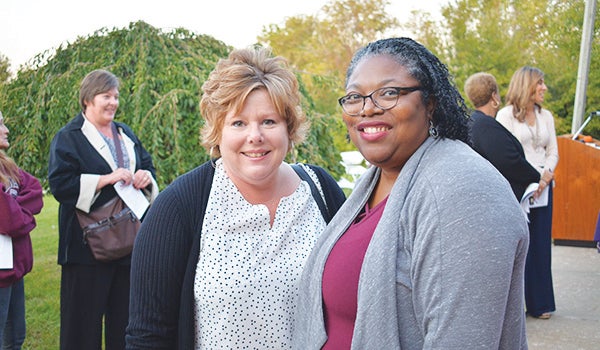DASAS continues 24/7 advocacy, support during COVID-19
Published 9:07 am Friday, March 27, 2020

- Deborah Hackworth, right, the interim director at Domestic and Sexual Assault Services, said the organization would continue to offer 24/7 advocacy and support amid the COVID-19 situation. She is pictured with former director Rose Ludwick. (Leader file photo)
|
Getting your Trinity Audio player ready...
|
THREE RIVERS — Isolation periods during COVID-19 could create a perfect storm for domestic violence.
Deborah Hackworth, the interim executive director of Domestic and Sexual Abuse Services, an organization dedicated to putting an end to domestic violence and sexual assault in southwest Michigan, said the organization is committed to providing 24/7 assistance to victims and survivors, despite COVID-19 isolation.
DASAS’ emergency shelter, Hillmann House, is continuing to run as usual to serve domestic violence and sexual assault survivors and their children from St. Joseph, Cass and Van Buren counties.
“We take the universal precautions and check to make sure our clients are feeling well and not running a fever,” Hackworth said. “We are discouraging them from taking unnecessary trips outside of the house, although we don’t forbid them from leaving because that would be taking away their civil rights and rights to their own determination, which is part of our empowerment philosophy that guides all of us.”
DASAS’ non-residential services are continued to be offered but are now technology-driven.
Hackworth said therapists are offering teletherapy through different forms of communication to isolated clients. Advocates are continuing to assist clients via telephone. DASAS’ personal protection order advocates who generally would be working inside the courthouse are continuing to answer calls and assist clients with virtually filling out personal protection orders online. The courts are still receiving personal protection orders online, Hackworth said.
“Our advocates and therapists are staying in communication with their clients to let them know what is going on and what is the best way to reach us,” she said. “Even during this time of isolation, our clients are not feeling as alone as maybe they would have.”
DASAS’ 24/7 crisis hotline is continuing to take calls from anyone who might be experiencing domestic or sexual abuse.
“One thing that we always concentrate on when we get calls through our crisis hotline or with anybody we meet with is safety planning,” Hackworth said. “A safety plan is a strategy to minimize the risk to a survivor’s safety, especially when they are still in contact or living with an abusive partner. That is what we are focusing on right now.”
Hackworth said safety plans are unique to each individual’s situation, and what may work for one person does not necessarily mean it will work for everybody.
Support groups, which traditionally meet weekly, stopped to obey Gov. Gretchen Whitmer’s mandates, Hackworth said.
“Even though our agency is considered an essential service, we want to make sure everyone is safe,” she said.
On Monday, a “stay-at-home” executive order was announced, urging Michiganders only to leave their residence for essentials. Hackworth said safety planning is key when a victim or survivor is isolated and living with their abuser.
“This isolation is just one of the tools that abusers use,” Hackworth said. “They now have another tool in their arsenal to ramp up the isolation and to ramp up their emotional, mental, financial and physical abuse of their victims.”
Hackworth offered these safety tips for those in isolation:
• Record abuse incidents in as much detail as possible. Write down dates, times and the sequence of events. If possible, take pictures of any injuries a victim or survivor may have.
• If a person senses an abusive incident may occur, try to avoid stairs and unsafe rooms like bathrooms or kitchens, which tend to have sharp objects or hard surfaces.
• Tell someone they trust. It could be a neighbor, a friend or a coworker — let someone know what is happening. Possibly create a code word to tell whomever the person is speaking with that they need help without an abusive partner knowing.
• Memorize or keep a list of phone numbers in a wallet, backpack, purse or shoe.
“A lot of times, we keep our numbers in a cell phone, but if an abuser is monitoring our cellphone use and looking through our cell phone, we want to have some numbers on hand in case we need to go someplace else and make a phone call,” Hackworth said.
The hardest thing Hackworth has to tell people is sometimes they have to give their abuser what they want to live another day.
“If a victim or survivor feels like their life is threatened, go along with the wishes of your abuser until you can get to a safe place,” she said. “When I first started doing this work, it would literally get caught in my throat to tell someone to do whatever they had to do to say safe. The number one thing I tell someone is this is not their fault, and they are not alone. We are here to help.”
Hackworth said in the changing times, DASAS is blessed to be not alone.
“We have a coalition in the state,” she said of DASAS’ subcontract with Domestic Violence Coalition, Inc. “My inbox is full of resources and information that they are sending out to support us as we support the clients that we serve. We couldn’t make it through this if we had to do it on our own.”






